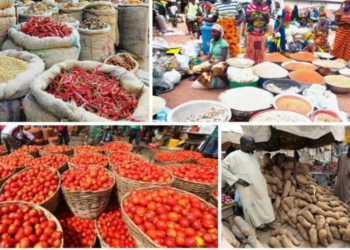- Ownership of 10 hectares in a structured oil palm estate can yield N2.1 billion over 30 years through crop income and land appreciation
- Palmrich Estate offers professionally managed farms with partnerships that reduce risk and ensure consistent returns
- Investors benefit from passive income, inflation-resistant assets, and long-term capital growth without direct farm management
After decades of stagnation, Nigeria’s palm oil industry is staging a strong comeback.
Rising local production, record profits at major processors, and the introduction of a national traceability system are converging to make palm oil one of the country’s most profitable agribusiness opportunities.
For investors, the question is no longer whether the sector can revive, but how to tap into its potential.
One of the most direct routes: securing 10 hectares or more in a professionally managed oil-palm estate, a move that can transform your capital into stable, long-term income.
The Numbers
Global palm oil production remains dominated by Southeast Asia, but Nigeria is re-accelerating. Foreign Agricultural Service, FAS/ USDA country data places Nigeria’s palm oil production around 1.5 million tonnes in recent seasons, against domestic consumption of roughly 1.8-2.7 million tonnes, leaving a persistent supply gap that domestic producers are filling.
In Nigeria, the National Bureau of Statistics and industry reporting show local dynamics shifting: Crude Palm oil (CPO) imports fell by about 26% in 2024, from N17.03 billion to N12.6 billion, as local production and processing capacity rose. That decline signals less dependency on foreign crude palm oil and stronger domestic supply chains.
Corporate results confirm this. Leading processors have posted exceptional earnings in 2024 -H1 2025: Presco Plc reported a Profit Before Tax (PBT) of N111.9 billion in H1 2025, up more than 120% year-on-year, while Okomu Oil Palm Company recorded a profit surge in Q2 2025 (pre-tax profit up 459% YoY for the quarter), underscoring strong margins across the value chain.
According to Businessday report, this sector has recorded N2.13 trillion worth of investment in seven years.
Economic policy is supporting growth, too. The government’s NaPOTS traceability system and plans to plant 100 million new palms are designed to strengthen Nigeria’s position regionally and globally. With global CPO prices forecast to rise to US$1,200/MT by year-end 2025, primarily due to biodiesel demand from Asia, Nigeria is entering a bullish price environment.
How to Profit from the Billion-Dollar Industry
Palm oil generates multiple revenue streams per hectare: fresh fruit bunches (FFB) for crude palm oil, palm kernel, palm-kernel cake for feed, and value from byproducts. In Nigeria today, mature commercial hectares can produce steady cash flow once palms reach maturity, while the land itself appreciates as estates are developed and infrastructure improves.
The combination of increasing CPO prices, strong local demand, and productive, professionally managed oil palm plantations has pushed investor returns far higher than many traditional asset classes.
Why 10 Hectares Offers Real Investor Value
For investors considering a sustainable income stream and an inflation-resistant asset, owning 10 hectares (or more) in a structured oil palm estate delivers steady returns with minimal management.
With 8,000+ hectares already cultivated across seven phases in Lagos, Oyo and Ogun states, and 11,000+ landlords, some of whom are already earning income, Palmrich Estate by Assetrise Limited has built a scalable model that combines land ownership, sustainable agriculture, and long-term value creation. Partnerships with Okitipupa Oil Palm Plc, Nigeria Institute for Oil Palm Research, NIFOR, AG Mortgage Bank, and Mutual Benefits Insurance further institutionalise results and transparency.
Model Projection – 10 Hectares:
- Early intercropping income: N3M across Years 1-2 (cassava)
- Oil palm returns onward Year 4+: N40M-N50M per year
- Projected land appreciation by Year 3: N160M+
- Cumulative return (30 years): N2.1B combining crop income & land value.
These projections are based on estate models that utilize high-yield seedlings, proven agronomic techniques, and strategic market positioning to maximise profitability.
The Palmrich’s Project’s unique combination of scale, structured management, and strong institutional backing significantly reduces the typical entry risks investors face in smallholder or unstructured agricultural ventures. By leveraging advanced cultivation techniques, expert agronomy, and long-term offtake partnerships, the estate ensures consistent productivity and profitability.
Advantages for 10-Hectare Owners:
- Capital growth from structured land ownership – Your asset appreciates as both the land and oil palm trees mature.
- Reduced exposure to FX volatility and market swings – Stable, locally driven demand for palm oil.
- Legacy-building asset – A tangible asset that can be passed down through generations.
- Hands-off wealth creation – No need to manage tenants, rent collections, or occupancy rates; returns flow from harvest cycles, not people management.
- Shared economies of scale – Benefit from large-scale mechanized operations and professional farm management without the overhead costs of running your own farm.
- Market security – Palm oil’s role in food, cosmetics, and biofuels creates diverse demand channels, shielding you from reliance on a single market segment.
Risks & Safeguards
- Disease/Agro risk: mitigated by expert management and research-based protocols from NIFOR.
- Price volatility: diversified return streams (oil and land) act as hedge.
- Land titling issues: only government-registered, encumbrance-free land parcels are accepted.
- Execution risk: Early phases (Phase 5) are already yielding returns, with clear evidence of payout efficacy.
The Right Time to Own
Nigeria’s palm oil industry isn’t just recovering, it’s accelerating. With record profits, rising global demand, supportive local policies, and proven models delivering structured returns, the opportunity is clear. And now, with Palmrich Farm, you can own an oil palm plantation at a more accessible entry point as low as ₦300,000 only.
This makes Palmrich Farm the perfect opportunity for:
- Investors are looking to tap into agriculture-backed assets.
- Families building generational wealth.
- Cooperatives seeking steady cash flow for members.
- Organisations are diversifying their portfolios into real assets
Palmrich Farm is located in Asa-Ilobi, Ewekoro, Ogun State, a fast-developing agribusiness hub.
The question is no longer if palm oil is profitable – it’s when you will take ownership of your share in Africa’s $70B market.
Limited units of Palmrich Farm are now open.
Visit www.palmrich.assetrise.com.ng today to own a producing asset that appreciates in value every year while paying you steady passive income.























